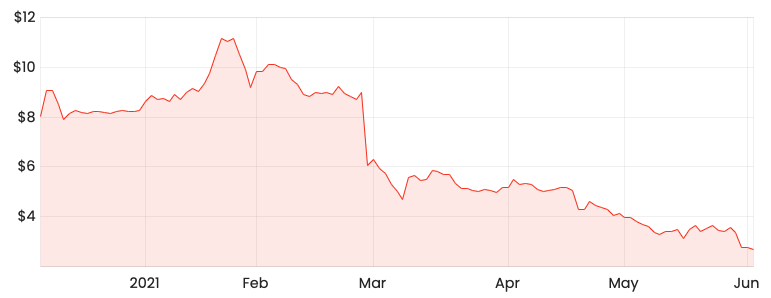Since a high of $11.15 in January, the Nuix Ltd (ASX: NXL) share price has plummeted 75% to $2.71.
Revenue downgrades, media allegations of governance and cultural issues, an opaque revenue model in addition to an overhanging lawsuit by its ex-CEO are all reasons for the sinking share price (and why I have watched from the sidelines so far).
Here I lay out what needs to change before I consider Nuix investable.
NXL share price

More conservative guidance disclosures
In April, Nuix downgraded guidance from $193.5 million in the initial prospectus to a range of $180-$185 million. Then less than six weeks later (and only one month to the end of the financial year) revenue guidance was again revised downward to $173-$182 million. Management cited uncertainty in the timing of upsell opportunities and new customers impacting revenue forecasts. This is not unique to Nuix.
Many companies including Altium Limited (ASX: ALU) and TechnologyOne Ltd (ASX: TNE) experience timing issues relating to contracts. The nature of many technology contracts is that deals close at or around 31 December and 30 June. Shareholders understand this uncertainty but expect management to compensate them by providing conservative forecasts.
Nuix needs to be less aggressive with future guidance. It’s much better to give a modest outlook and then outperform.
Underpromise and overdeliver. Not the other way around.
Address media allegations properly
In the space of three months, the board has been forced twice to respond to media publications. The articles have alleged:
- Issues regarding the prospectus providing “wide-ranging exculpation and protection for Nuix from all financial errors and mismanagement”
- Internal documents showing staff churn over 35%
- Cost cuts pre-IPO with Nuix losing 30% of its engineering department
- A toxic corporate culture, further supported by a 3 out of 5 glassdoor rating and 29% approval of CEO
- Governance concerns regarding past founder Tony Castagna
- Six senior executives presenting a new vision labelled ‘Nuix 2.0’ and demanding the resignation of CEO Rod Vawdrey
The consultancy agreement with Castagna has since been terminated. Moreover, the board will appoint more independent directors in addition to an independent board sub-committee to investigate “internal legal and risk management functions”.
However, the responses by Nuix have been largely vague, failing to address many of the allegations. Instead, the company reiterates its “sticky customer base, powerful processing engine and strong fundamentals”.
Allowing the claims to go unchecked erodes confidence in management. The board needs to address each allegation, own up to past mistakes and implement quantifiable targets, which are disclosed annually. This will alleviate shareholder concern and signal the company is (back) on track.
Increase revenue model transparency
As a writer at Rask, we have a tool that scans our copy for readability. The idea is that an article should be easily read by an 11-year old while leaving the reader more informed.
Nuix needs to adopt a similar mindset to its revenue model.
The company is currently transitioning from license sales to a consumption-based model based on data usage. Rather than the Nuix engine processing unlimited data for a fixed fee, customers will be charged based on how much data is processed. This leverages Nuix revenues to the needs of its customers, allowing the business to bring in more revenue as consumption rises.
Despite trying my best to simply explain the revenue model (as I have attempted above), I can sympathise with why investors remain perplexed by the revenue model let alone its accounting recognition.
The company needs to be far more transparent around its sales, provide case studies and demonstrate why consumption-based revenue is superior to license.
Settle with former CEO
Before the guidance downgrades and media publications, Nuix was already battling its former CEO, Eddie Sheehy. Without delving into the specifics, Sheehy claims he is owed up to $200 million in damages relating to an options package he received in 2007.
Regardless of which side is right or wrong, it’s in the best interest of shareholders to settle this claim rather than proceeding to the courts. Nuix could issue Sheehy new shares. This would dilute current shareholders but protect against a worst-case outcome of $200 million in cash damages.
I’m no expert in commercial law, but given the distractions surrounding Nuix, settling with Sheehy would be one less distraction for management to worry about.
Final thoughts
It’s easy to forget that the Nuix engine is a powerful software tool with the potential to underpin a growing and profitable business.
However, before it can reach its potential, the board needs to work on repairing the firm’s public image and relationship with shareholders.
For those watching from the sidelines like myself, I’d consider Nuix investible when management implements material steps towards the above four points.
Note, this doesn’t mean it’s a buy. It means the real analysis can begin.







